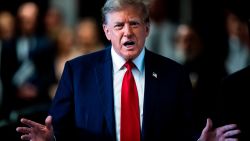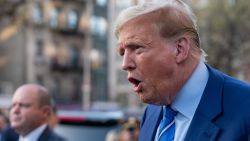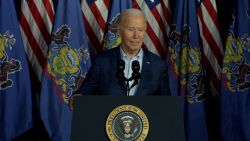To hear Rep. Steve Scalise tell it, President Donald Trump nearly won the Louisiana governor’s race all by himself.
“Eddie Rispone made up a 22-point disadvantage over the last month because of President Trump’s involvement,” the Louisiana Republican congressman said of the party’s gubernatorial nominee. “Clearly, President Trump’s involvement made a big difference at helping close that massive gap.”
Not only is that not true, but the numbers from Democratic Gov. John Bel Edwards’ victory on Saturday night suggest the opposite could be the case: Trump’s repeated presence in the state could have actually pushed the Democrat to a narrow victory.
Let’s first debunk Scalise’s claim.
The congressman is getting the idea that Rispone was behind Edwards by 22 points from the October 12 “jungle” primary, where all candidates of all parties run on a single ballot. If any candidate gets a simple majority of the vote in the primary, they are the winner outright. If no candidate gets 50%, the top two vote-getters advance to the runoff.
That latter scenario is what happened this year in Louisiana. In the primary, Edwards got 47% of the vote. Rispone got 27%. Which is close-ish to the 22-point gap that Scalise is claiming. Except here’s the thing: Another Republican candidate – Rep. Ralph Abraham – took 24% of the vote.
Which, when you do all the math, you see that all of the Democratic candidates (Edwards plus a candidate named Oscar Dantzler) took a total of 47.4% in the jungle primary, while the collective Republican candidates received 51.8% of the vote. (The other .8% of the October electorate voted for “other” candidates.)
So it’s deeply misleading for Scalise to suggest that Trump somehow brought Rispone back from a 20-point deficit. If Rispone on Saturday had only won all the votes of people who voted for one of the Republican candidates last month, he would have won. Simple. (Also worth noting: Polling going into Saturday’s vote suggested that the race would be close – and had been close since the end of the jungle primary.)
Now, to the second point: How Trump’s presence in the state might very well have provided Edwards his narrow margin of victory.
Trump went to Louisiana twice over the final week of this campaign. His trips were covered extensively by local media. He sent a series of tweets out – both before the election and on Saturday – urging people to vote for Rispone. “You got to give me a big win, please, OK?” Trump urged the crowd in Louisiana during his last visit on Thursday.
In short: There was absolutely no way that you could head to the polls on Saturday and not know a) who Trump supported and b) what sort of signal you would be sending the President with your vote.
Which makes the massive victories for Edwards in urban and suburban areas very, very interesting. Here’s CNN’s Harry Enten on that very point:
“Edwards emerged with 90% of the vote in urban Orleans Parish and 66% of the vote in partially urban and partially suburban East Baton Rouge Parish. They are home to the two most populous cities (New Orleans and Baton Rouge) in the state. Trump did lose both of those in 2016. Yet Democrat Hillary Clinton only won Orleans with 81% and East Baton Rouge with 52%. Edwards’ 90% in Orleans is particularly impressive given he took 87% of it in 2015, when he first won election statewide with 56% of the vote.
“The movement of suburban areas away from the Republicans is most clearly seen in Jefferson Parish, on the border with Orleans. Edwards won it with 57% of the vote on Saturday. This was impressive. Clinton won a mere 41% of the vote there in 2016. Heck, Edwards took a bare majority of 51% in his 2015 victory.”
We’ve seen this before. Democrats won back the majority in the Virginia state House and state Senate earlier this month thanks to gains made in suburban seats in northern Virginia and around Richmond. Kentucky Gov.-elect Andy Beshear toppled incumbent Matt Bevin (R) due in large part to his margins in urban and suburban areas. The tale of the 2018 midterm elections nationally – and Democrats’ retaking of the House – was the party’s pickups in suburban districts in Florida, Pennsylvania and California.
It’s long been accepted wisdom that no one motivates the Republican base like Donald Trump. But with results like in Louisiana, Kentucky and Virginia, it also appears to be true that no one motivates the Democratic base – and the swing suburban vote – like Donald Trump either.
That reality has already cost Republicans at the state and federal level over the first three years of Trump’s presidency. And if it continues, it could cost Trump a second term next November.


















